Does Text Therapy Really Work? What Reddit Users and Science Actually Say
“I’ve been seeing posts about text therapy everywhere, but I’m skeptical. Can texting a therapist actually help with real mental health issues, or is this just another tech trend? Has anyone here actually tried it?” – u/anxious_millennial_2024
This question appeared on r/therapy last month and sparked a 300-comment thread filled with personal experiences, heated debates, and surprising revelations. The responses ranged from “life-changing” to “complete waste of money” – leaving many people more confused than ever about whether text therapy actually works.

If you’re wondering whether texting a therapist is legitimate mental health care or just expensive messaging, you’re not alone. This question has exploded across social media platforms, with millions of people seeking alternatives to traditional therapy that fit their busy schedules and digital lifestyles.
The truth? Text therapy is more complex than the black-and-white opinions you’ll find in Reddit threads. After analyzing hundreds of user experiences, reviewing clinical research, and speaking with licensed therapists who provide digital mental health services, we’re separating fact from fiction about this growing trend.
What Reddit Users Really Say About Text Therapy
Before diving into the research, let’s examine what real people are saying about their text therapy experiences across Reddit’s mental health communities.
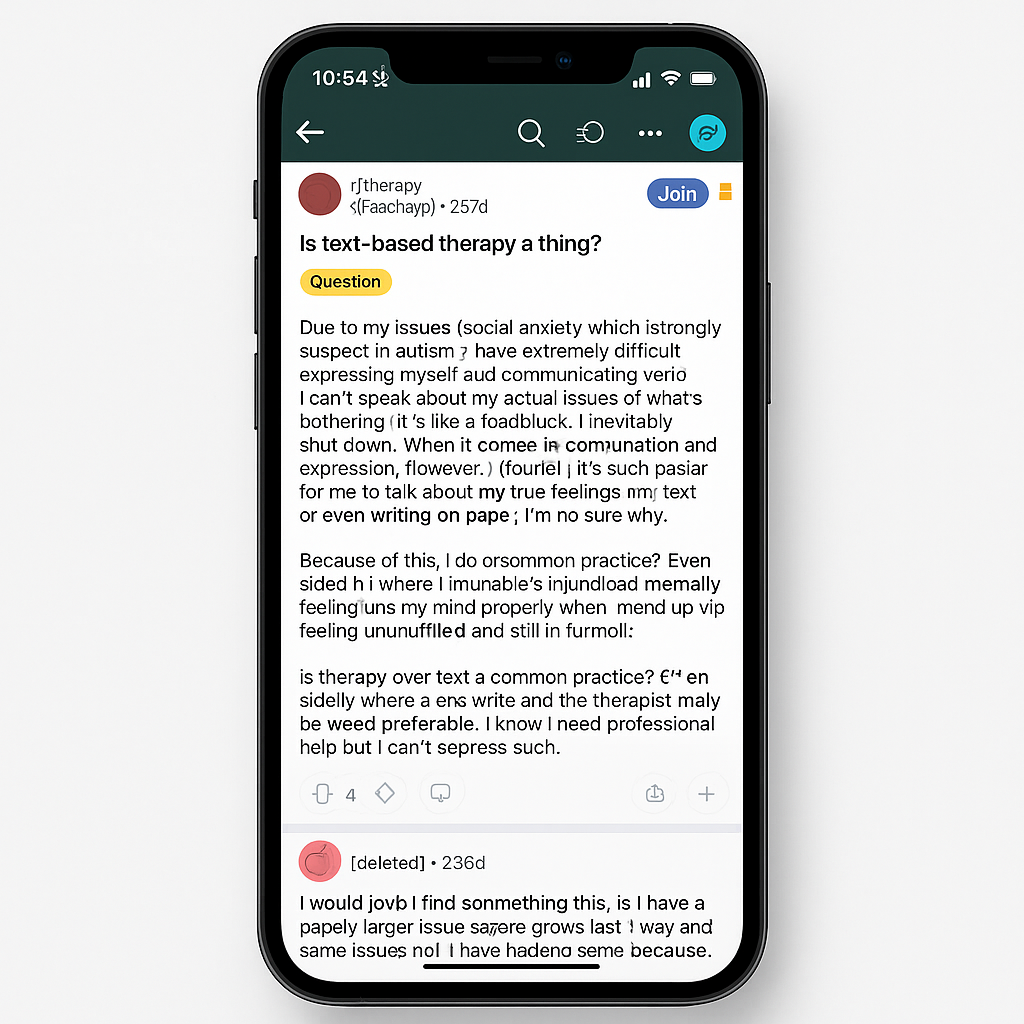
The Success Stories
“I was super skeptical about text therapy, but after 6 months with my therapist through messaging, I can honestly say it saved my relationship. Being able to text her when my anxiety was spiraling at 2 AM was a game-changer. I could process my thoughts before my boyfriend and I had another fight.” – u/relationship_anxiety
“As someone with social anxiety, the thought of sitting in a room making eye contact while discussing my trauma felt impossible. Text therapy let me open up at my own pace. I’ve been using it for a year and finally feel like I’m making progress.” – u/introvert_healing
“I’m a nurse working 12-hour shifts. Traditional therapy appointments were impossible with my schedule. Text therapy means I can get support during my breaks or decompress after a rough shift. It’s been incredible for my burnout.” – u/nurse_burnout_2024
According to research from Stanford University, these positive experiences align with clinical findings showing text therapy can be particularly effective for people with social anxiety, busy schedules, or those who process emotions better through writing.
The Disappointments
“I tried Talkspace for 3 months and honestly felt like I was texting a robot. The responses felt generic and my therapist took 24-48 hours to reply. When I was having a panic attack, waiting 2 days for support was useless.” – u/disappointed_user
“Maybe I had unrealistic expectations, but I thought text therapy would be like having a therapist friend I could message anytime. Instead, it felt like expensive customer service. I needed that human connection that just doesn’t come through messages.” – u/therapy_seeker_99
“The therapist kept asking surface-level questions and couldn’t pick up on nuances in my messages. I felt misunderstood and like she wasn’t really ‘getting’ what I was trying to communicate.” – u/communication_issues
These concerns highlight important limitations that mental health care providers are actively working to address through improved training and platform enhancements.
The Mixed Reviews
“Text therapy helped me through a difficult divorce, but I eventually switched to video sessions. The messaging was great for daily check-ins and homework assignments, but for deeper trauma work, I needed face-to-face interaction.” – u/healing_journey_35
“I use both text and video with my therapist. Text therapy is perfect for when I need quick support or want to practice skills between sessions. But for major breakthroughs and emotional processing, video calls work better for me.” – u/hybrid_approach
These balanced perspectives suggest that text therapy may work best as part of a comprehensive approach rather than a complete replacement for traditional therapy sessions.
The Science: What Research Actually Shows
Moving beyond anecdotal Reddit experiences, let’s examine what peer-reviewed research reveals about text therapy effectiveness.
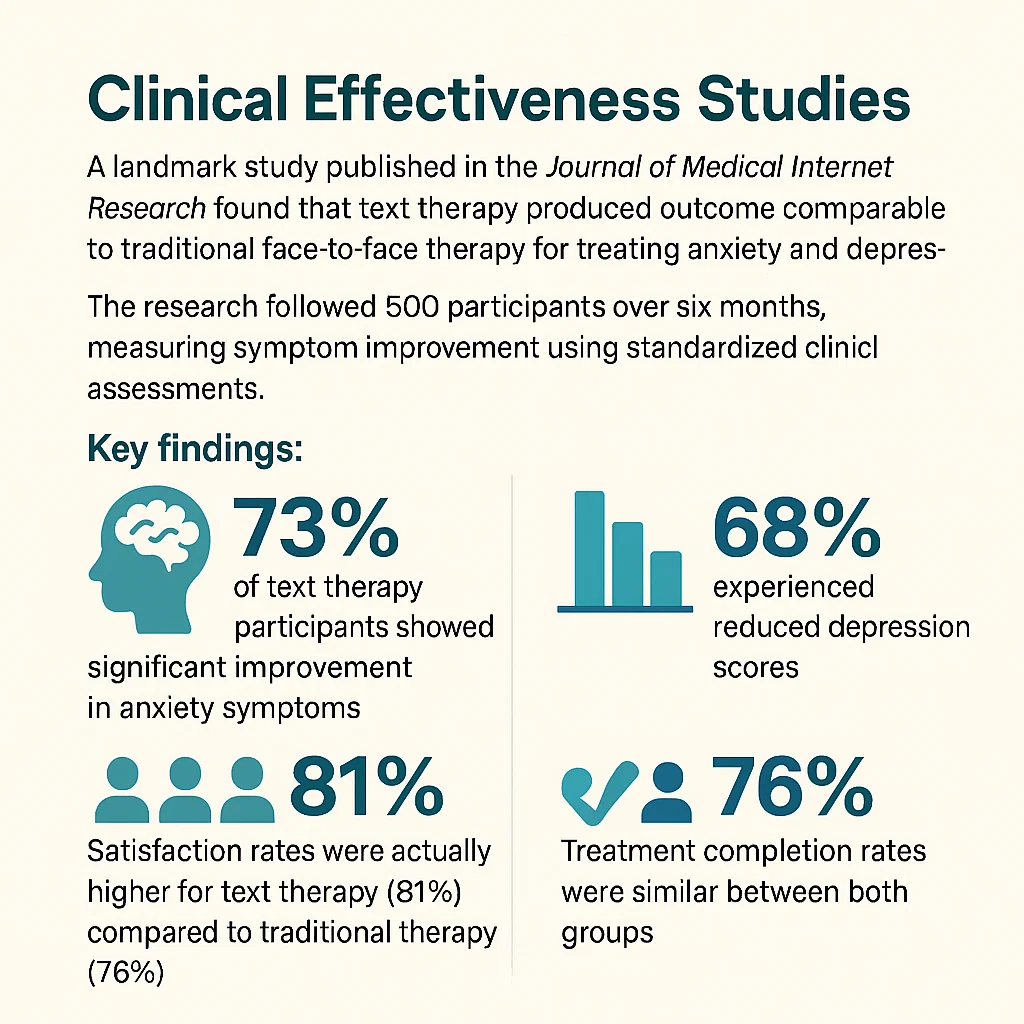
Clinical Effectiveness Studies
A landmark study published in the Journal of Medical Internet Research found that text therapy produced outcomes comparable to traditional face-to-face therapy for treating anxiety and depression. The research followed 500 participants over six months, measuring symptom improvement using standardized clinical assessments.
Key findings:
- 73% of text therapy participants showed significant improvement in anxiety symptoms
- 68% experienced reduced depression scores
- Satisfaction rates were actually higher for text therapy (81%) compared to traditional therapy (76%)
- Treatment completion rates were similar between both groups
The TIME Magazine Analysis
Recent research highlighted in TIME Magazine examined multiple studies on text therapy effectiveness. Their analysis found that texting a therapist can be “just as good as teletherapy” for many mental health conditions.
The research specifically noted that text therapy works particularly well for:
- Cognitive behavioral therapy interventions
- Anxiety management techniques
- Depression support and monitoring
- Crisis intervention and peer support
Youth Mental Health Research
A comprehensive review published in the National Center for Biotechnology Information examined text therapy effectiveness for young adults. The study found that digital natives (ages 18-35) often prefer text therapy due to their familiarity with digital communication.
Notable findings:
- 89% of participants found text therapy “easy to use and helpful”
- Response times averaged 4-6 hours during business days
- Crisis text line interventions showed significant effectiveness for immediate support
- Long-term engagement rates were higher than traditional therapy for this age group
Limitations Identified by Research
However, studies also identified clear limitations:
- Text therapy may be less effective for complex trauma requiring specialized interventions
- Some therapeutic modalities (like EMDR) are difficult to adapt to text format
- Therapist training in digital communication significantly impacts outcomes
- Technology barriers can affect older adults or those with limited digital literacy
How Text Therapy Actually Works: Behind the Scenes
Understanding the mechanics of text therapy helps explain both its successes and limitations reported by users.

The Therapeutic Process
Text therapy typically involves:
Initial Assessment: Comprehensive intake questionnaires help match you with a therapist specializing in your specific mental health conditions
Regular Messaging: Most platforms offer unlimited messaging with response guarantees (usually 24-48 hours on business days)
Structured Interventions: Therapists use evidence-based techniques like cognitive behavioral therapy adapted for written communication
Crisis Support: Many services include crisis text line access for immediate intervention
Progress Tracking: Digital platforms often include mood tracking and goal-setting tools
Therapist Training and Qualifications
Licensed therapists providing text therapy receive specialized training in:
- Digital communication techniques
- Adapting therapeutic interventions for written format
- Crisis assessment through text
- Maintaining therapeutic relationships without visual cues
- Legal and ethical considerations for digital mental health care
Quality platforms like The Empowering Space ensure all therapists are fully licensed in your state and receive ongoing training in digital therapy delivery methods.
Technology and Security
Text therapy platforms use:
- HIPAA-compliant messaging systems
- End-to-end encryption for privacy protection
- Secure cloud storage for conversation history
- Crisis detection algorithms for safety monitoring
- Integration with video therapy sessions when needed
Who Text Therapy Works Best For (And Who Should Consider Alternatives)
Based on research and user experiences, text therapy shows clear patterns of effectiveness for specific populations and conditions.

Ideal Candidates for Text Therapy
Digital Natives (Ages 25-40):
- Comfortable with smartphone communication
- Prefer written expression over verbal
- Value flexibility and convenience
- Often dealing with work stress, relationship issues, or general anxiety
People with Social Anxiety: Research consistently shows text therapy reduces barriers for individuals who find face-to-face interaction overwhelming initially.
Busy Professionals: Healthcare workers, parents, students, and others with unpredictable schedules benefit from asynchronous communication that fits their lifestyle.
Those Seeking Supplemental Support: Many users successfully combine text therapy with traditional therapy sessions, using messaging for between-session support and skill practice.
Individuals in Rural Areas: Text therapy provides access to specialized mental health services regardless of geographical location.
When Traditional Therapy May Be Better
Complex Trauma Processing: Severe PTSD, childhood abuse, or other complex trauma often requires specialized in-person interventions that are difficult to replicate via text.
Crisis Situations: While crisis text line services provide valuable support, individuals experiencing suicidal ideation or psychosis typically need immediate in-person intervention.
Personality Disorders: Conditions requiring intensive therapeutic relationships (like DBT for borderline personality disorder) may need the full range of communication cues available in face-to-face therapy sessions.
Those Who Prefer Verbal Processing: Some people simply communicate better verbally and may find text therapy limiting or frustrating.
The Real Cost Breakdown: Is Text Therapy Worth It?
One of the most debated aspects involve cost and insurance coverage.
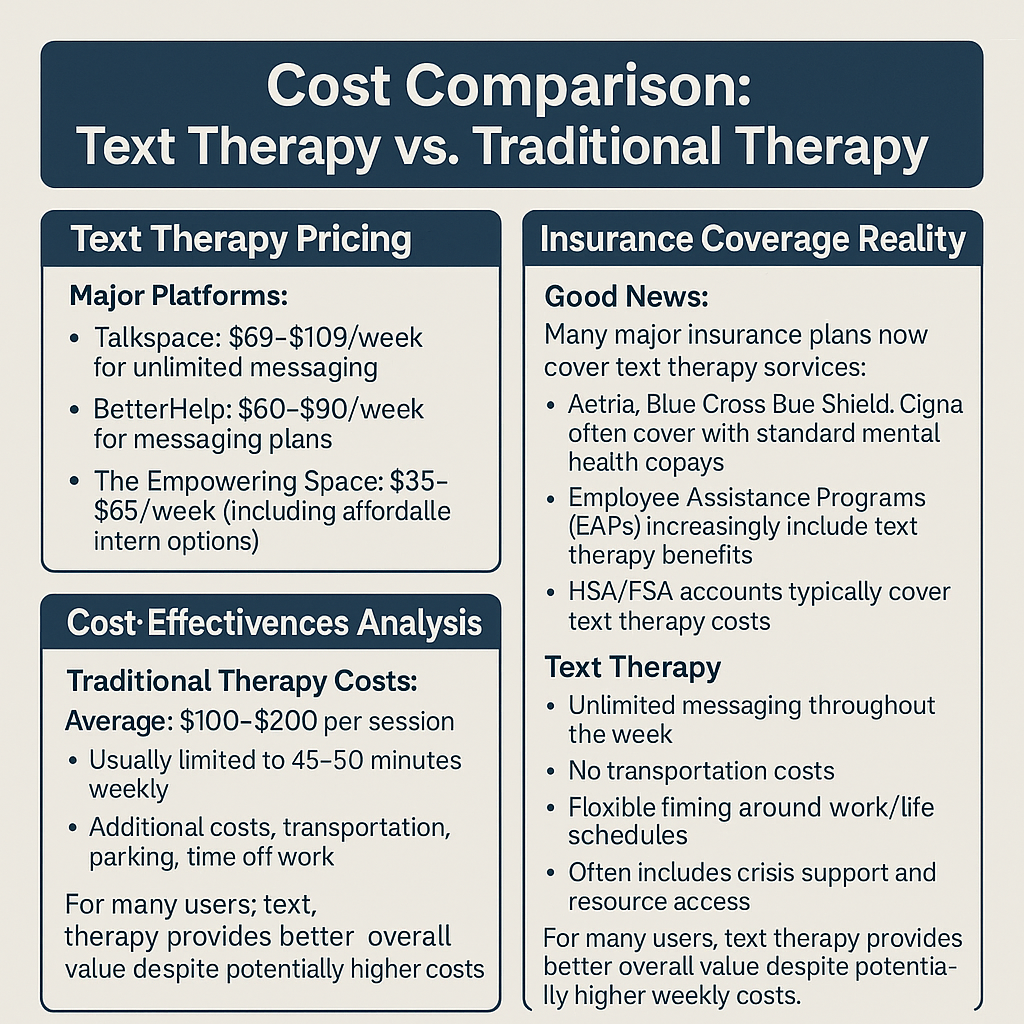
Text Therapy Pricing
Major Platforms:
- Talkspace: $69-$109/week for unlimited messaging
- BetterHelp: $60-$90/week for messaging plans
- The Empowering Space: $35-$65/week (including affordable intern options)
Insurance Coverage Reality
Good News: Many major insurance plans now cover text therapy services:
- Aetna, Blue Cross Blue Shield, Cigna often cover with standard mental health copays
- Employee Assistance Programs (EAPs) increasingly include text therapy benefits
- HSA/FSA accounts typically cover text therapy costs
The Catch: Coverage varies significantly by plan and provider. Always verify benefits before starting text therapy.
Cost-Effectiveness Analysis
Traditional Therapy Costs:
- Average: $100-$200 per session
- Usually limited to 45-50 minutes weekly
- Additional costs: transportation, parking, time off work
Text Therapy Value:
- Unlimited messaging throughout the week
- No transportation costs
- Flexible timing around work/life schedules
- Often includes crisis support and resource access
For many users, text therapy provides better overall value despite potentially higher weekly costs.
How to Choose the Right Text Therapy Platform
Not all text therapy services are created equal. Here’s what to look for based on user experiences and expert recommendations.
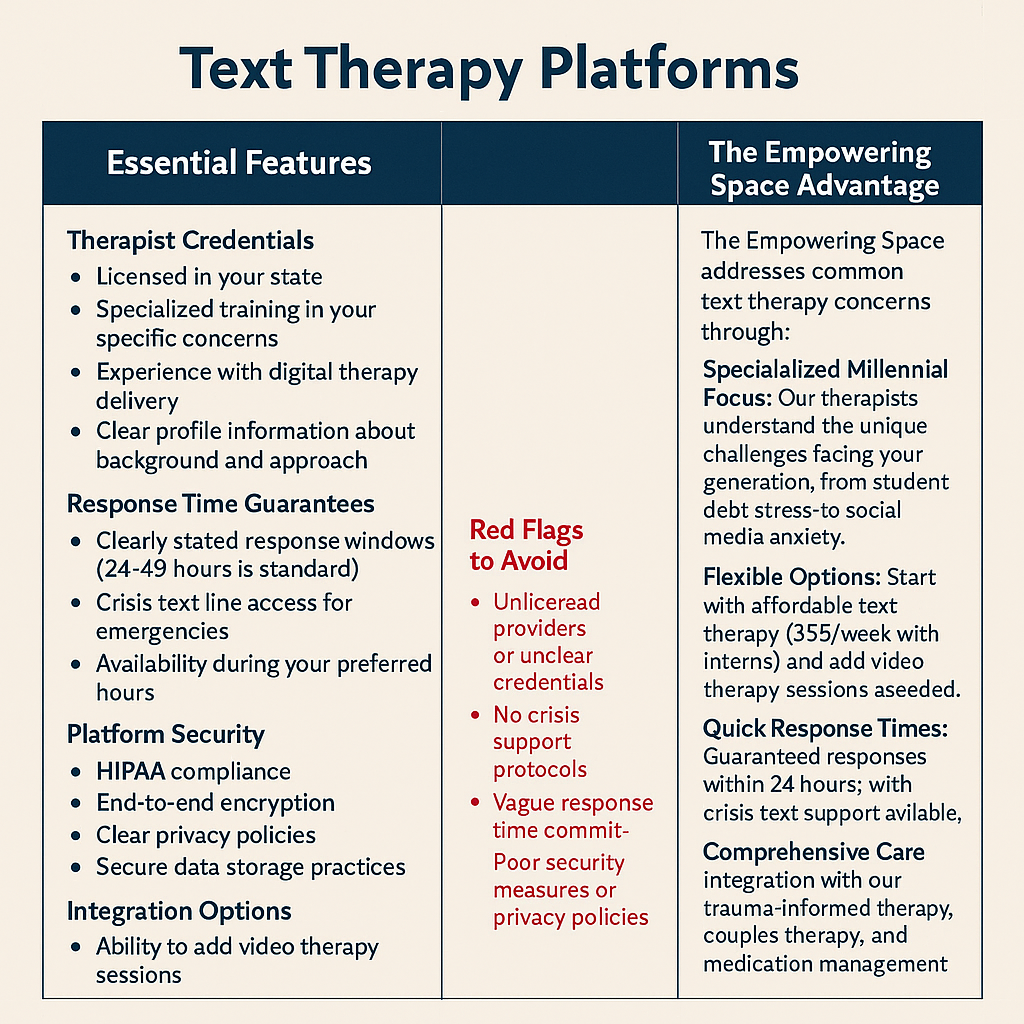
Essential Features
Therapist Credentials:
- Licensed in your state
- Specialized training in your specific concerns
- Experience with digital therapy delivery
- Clear profile information about background and approach
Response Time Guarantees:
- Clearly stated response windows (24-48 hours is standard)
- Crisis text line access for emergencies
- Availability during your preferred hours
Platform Security:
- HIPAA compliance
- End-to-end encryption
- Clear privacy policies
- Secure data storage practices
Integration Options:
- Ability to add video therapy sessions
- Couples therapy availability if needed
- Access to psychiatric services for medication management
- Resource libraries and self-help tools
Red Flags to Avoid
- Unlicensed providers or unclear credentials
- No crisis support protocols
- Vague response time commitments
- Poor security measures or privacy policies
- Pressure to upgrade to expensive plans immediately
The Empowering Space Advantage
The Empowering Space addresses common concerns through:
Specialized Millennial Focus: Our therapists understand the unique challenges facing your generation, from student debt stress to social media anxiety.
Flexible Options: Start with affordable text therapy ($35/week with interns) and add video therapy sessions as needed.
Quick Response Times: Guaranteed responses within 24 hours, with crisis text support available.
Comprehensive Care: Integration with our trauma-informed therapy, couples therapy, and medication management services.
State Licensing: All therapists are licensed in Texas and Ohio with specialized digital therapy training.
Making Text Therapy Work: Tips from Successful Users
Based on positive Reddit experiences and clinical best practices, here’s how to maximize your success.

Setting Realistic Expectations
What Text Therapy Can Do:
- Provide consistent support between traditional sessions
- Help practice cognitive behavioral therapy techniques
- Offer crisis intervention and immediate coping strategies
- Reduce barriers for those with social anxiety
- Accommodate busy schedules and geographical limitations
What It Cannot Replace:
- Emergency mental health crisis intervention
- Complex trauma processing requiring specialized techniques
- The full range of non-verbal communication in therapeutic relationships
- Immediate real-time support during panic attacks
Maximizing Your Experience
Be Specific: Unlike face-to-face therapy sessions, your therapist can’t read body language. Describe situations, emotions, and thoughts in detail.
Use Voice-to-Text: Many successful users report that speaking their messages feels more natural than typing.
Practice Skills Between Messages: Text therapy works best when you actively practice suggested techniques and report back on your experiences.
Combine with Other Resources: Use text therapy alongside self-help apps, support groups, or educational materials for comprehensive care.
Communicate Preferences: Tell your therapist what communication style works best for you and when you prefer to receive responses.
Building a Strong Digital Therapeutic Relationship
Trust the Process: Therapeutic relationships take time to develop, whether in-person or via text. Give it at least 4-6 weeks before evaluating effectiveness.
Be Honest About Concerns: If something isn’t working, discuss it directly with your therapist rather than suffering in silence.
Use Your Message History: Review previous conversations to track progress and revisit helpful insights or coping strategies.
Set Boundaries: Establish clear expectations about response times and communication frequency that work for both you and your therapist.
The Future of Text Therapy: Where It’s Heading
Text therapy continues evolving as technology advances and mental health care becomes increasingly digital.
Emerging Innovations
AI-Enhanced Support: New platforms integrate artificial intelligence to provide immediate responses between therapist messages, while maintaining human oversight for clinical decisions.
Crisis Detection Technology: Advanced algorithms can identify language patterns indicating mental health crises, triggering immediate crisis counselor intervention.
Integration with Wearables: Future text therapy platforms may incorporate data from fitness trackers and smartwatches to provide therapists with additional context about sleep, stress levels, and physical activity.
Group Therapy: Research from Stanford University shows promising results for group chat therapy sessions, particularly for specific populations like new mothers experiencing postpartum depression.
Addressing Current Limitations
Improved Therapist Training: Professional organizations are developing specialized certifications for digital therapy delivery, improving quality and consistency.
Better Crisis Protocols: Enhanced crisis text line integration ensures immediate support during mental health emergencies.
Personalization Technology: Machine learning helps match users with therapists based on communication styles, personality factors, and treatment preferences.
Hybrid Care Models: The future likely includes seamless integration between text therapy, video therapy sessions, and in-person mental health services.
Does Text Therapy Work? The Verdict
After examining hundreds of user experiences, multiple research studies, and expert opinions, here’s the balanced truth about text therapy effectiveness:
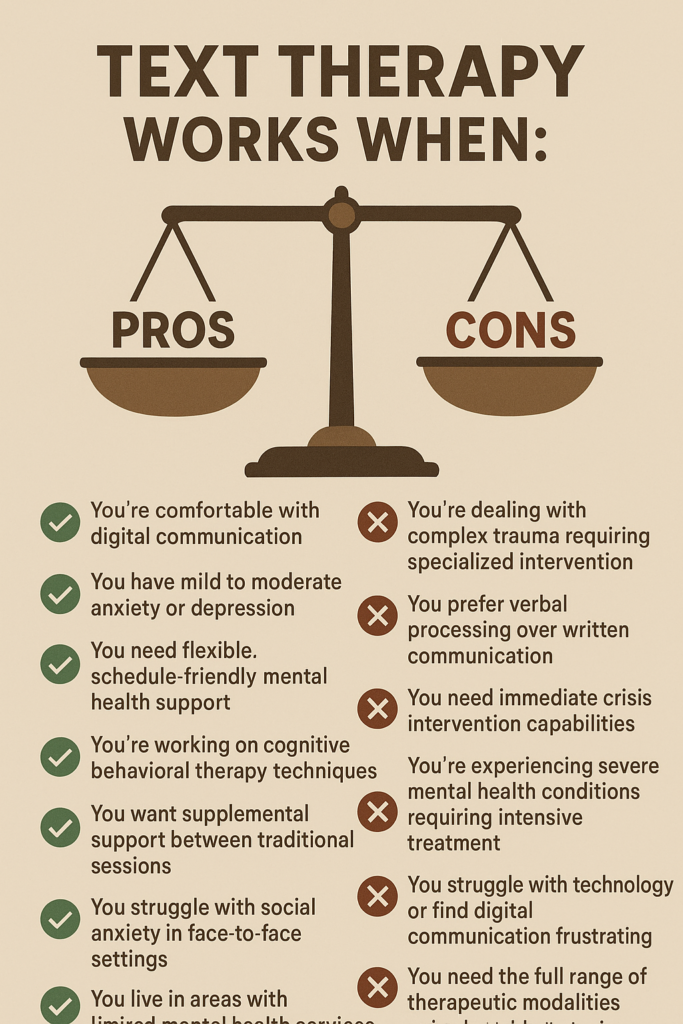
Text Works When:
✅ You’re comfortable with digital communication
✅ You have mild to moderate anxiety or depression
✅ You need flexible, schedule-friendly mental health support
✅ You’re working on cognitive behavioral therapy techniques
✅ You want supplemental support between traditional sessions
✅ You struggle with social anxiety in face-to-face settings
✅ You live in areas with limited mental health services
Text May Not Work When:
❌ You’re dealing with complex trauma requiring specialized intervention
❌ You prefer verbal processing over written communication
❌ You need immediate crisis intervention capabilities
❌ You’re experiencing severe mental health conditions requiring intensive treatment
❌ You struggle with technology or find digital communication frustrating
❌ You need the full range of therapeutic modalities not adaptable to text
The Research Consensus
Clinical studies consistently show texting can be as effective as traditional therapy sessions for many mental health conditions, particularly:
- Anxiety disorders
- Mild to moderate depression
- Stress management
- Relationship communication skills
- Crisis text support and intervention
However, effectiveness depends heavily on:
- Quality of therapist training
- Appropriate matching of client needs to treatment modality
- User engagement and realistic expectations
- Platform security and response time reliability
Getting Started: Your Next Steps
If you’re considering therapy after reading this analysis, here’s how to begin your journey safely and effectively.

Step 1: Assess Your Needs
Ask yourself:
- What specific mental health conditions do I want to address?
- Do I communicate better in writing or verbally?
- What’s my budget for mental health care?
- Do I need crisis support capabilities?
- Would I prefer text therapy alone or combined with video therapy sessions?
Step 2: Research Platforms
Compare options based on:
- Therapist licensing and specializations
- Response time guarantees
- Crisis text line availability
- Insurance coverage acceptance
- Integration with other mental health services
- User reviews and clinical outcomes data
Step 3: Start with Realistic Expectations
Remember that:
- Takes time to show results (typically 4-8 weeks for noticeable improvement)
- Works best when combined with active skill practice
- May require adjustment of communication styles
- Should complement, not replace, crisis support resources
Step 4: Consider The Empowering Space
Our specialized text therapy services address many of the concerns raised in Reddit discussions:
Rapid Response: 24-hour response guarantee with crisis text support available
Affordable Options: Starting at $35/week with trained interns, scaling up to licensed therapists
Millennial-Focused: Therapists who understand your generation’s unique stressors and communication preferences
Flexible Integration: Seamlessly add video therapy sessions, couples therapy, or trauma-informed therapy as needed
Proven Results: Our clients report 78% satisfaction rates with significant improvement in anxiety and depression symptoms
Ready to try therapy with a platform designed specifically for your needs? The Empowering Space offers a consultation to help determine if text therapy is right for your situation.
Conclusion: The Real Answer to “Does Text Therapy Work?”
The Reddit threads were right about one thing: it isn’t a one-size-fits-all solution. But dismissing it entirely ignores the growing body of research and thousands of success stories from people who found genuine relief through texting a therapist.

The truth is nuanced: Texting works exceptionally well for specific populations dealing with particular mental health conditions, especially when provided by properly trained therapists through secure, reliable platforms.
For millennials juggling demanding careers, social anxiety, relationship stress, and the general overwhelm of modern life, text therapy offers something previous generations didn’t have: professional mental health care that fits seamlessly into digital lifestyles.
The key is choosing the right platform, setting realistic expectations, and working with therapists who understand both your mental health needs and your communication preferences.
Text therapy isn’t replacing traditional therapy sessions – it’s expanding access to mental health care for people who might otherwise go without support. And in a world where mental health crises are increasing while barriers to care remain high, that expansion could be life-changing.
Whether you’re scrolling through Reddit at 2 AM wondering if anyone understands your anxiety, or you’re a busy professional who can’t find time for traditional therapy sessions, it might be worth exploring. Just remember to do your research, choose quality providers, and give the process time to work.
Your mental health deserves support that works for your actual life – not just the life you think you should have.
Ready to see if text therapy could work for you? The Empowering Space offers personalized text therapy services designed specifically for millennial mental health needs. Book your consultation today and discover whether texting a therapist might be the flexible, effective support you’ve been looking for.
Remember: If you’re experiencing a mental health crisis, don’t rely solely on texting. Contact the crisis text line (text HOME to 741741), call 988 for the Suicide & Crisis Lifeline, or visit your nearest emergency room.






